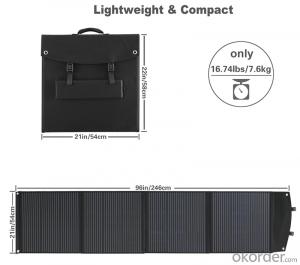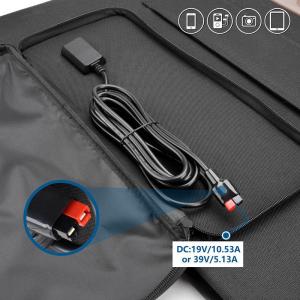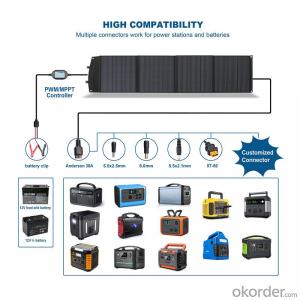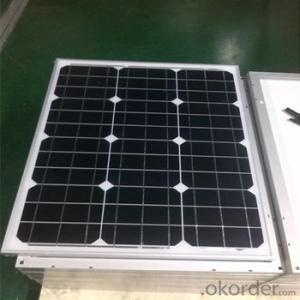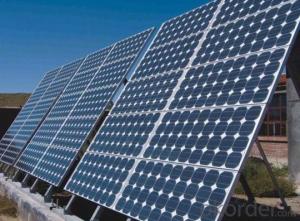Monocrystalline Energy Precio 12V 100W 300W 400W Cells Power Flexible Solar Panel factory
- Loading Port:
- Stock in Panama
- Payment Terms:
- TT OR LC
- Min Order Qty:
- 100 pc
- Supply Capability:
- 1000000 pc/month
OKorder Service Pledge
Quality Product, Order Online Tracking, Timely Delivery
OKorder Financial Service
Credit Rating, Credit Services, Credit Purchasing
You Might Also Like
Item specifice
Material:
Monocrystalline Silicon
Max. Power(W):
400
Number of Cells(pieces):
144

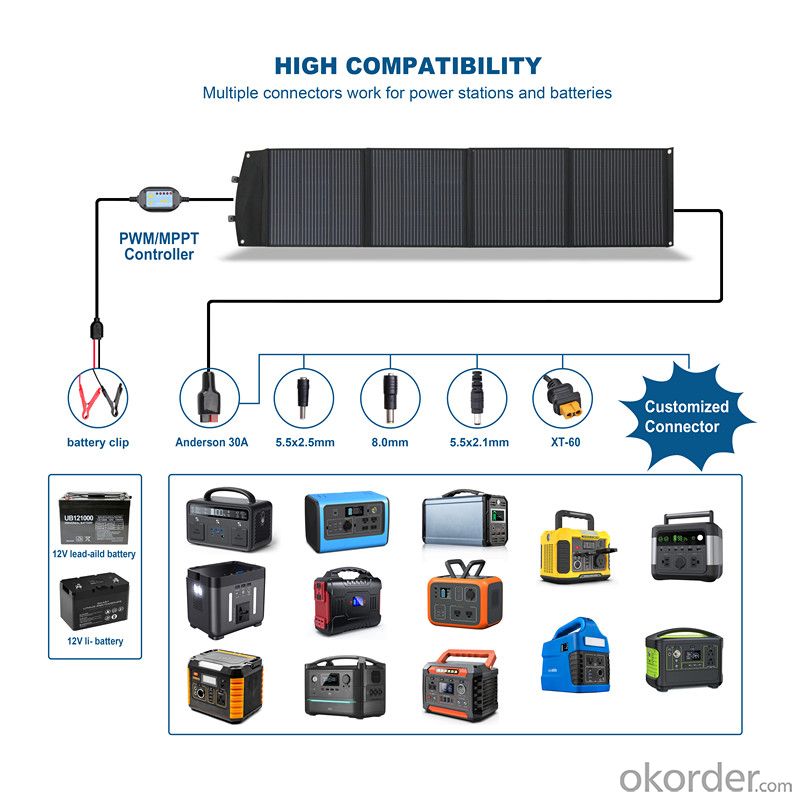
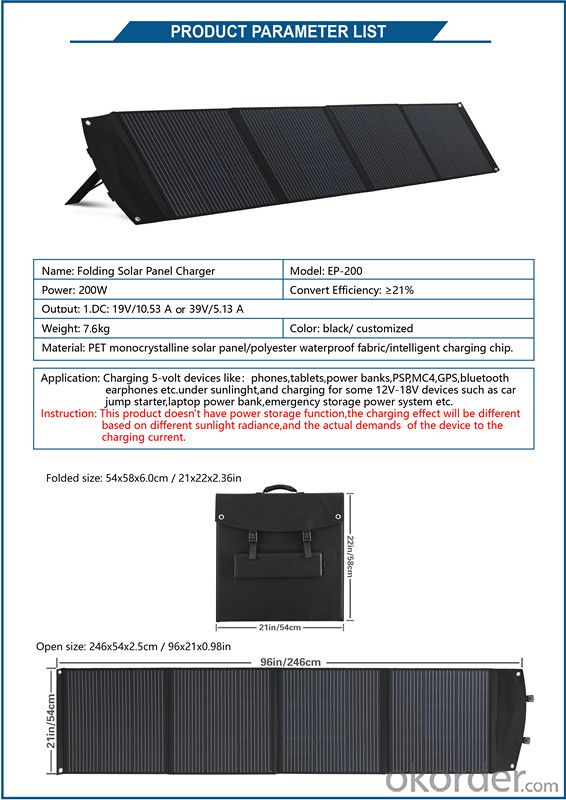
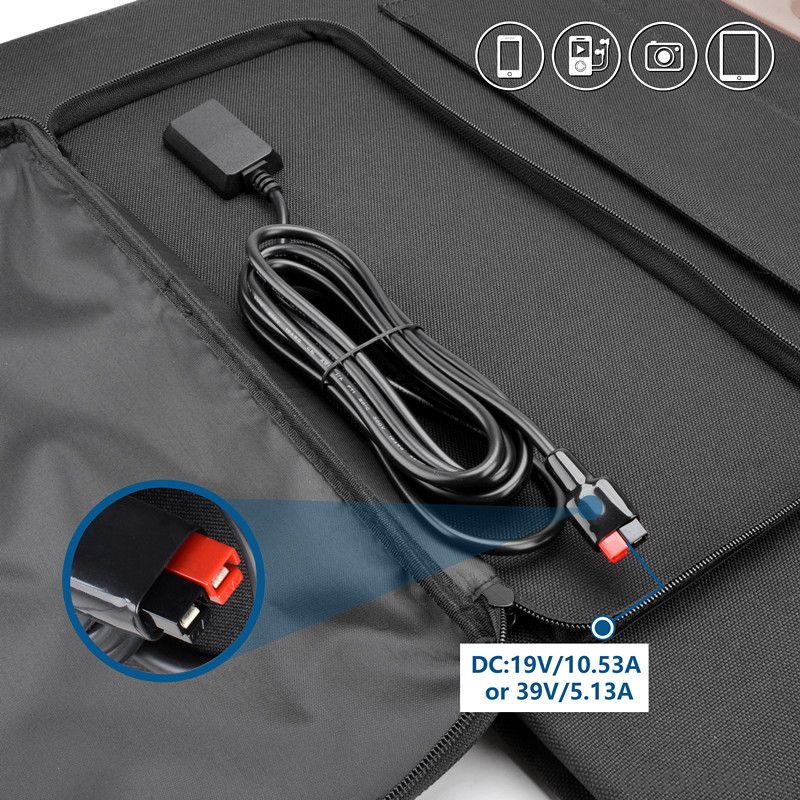
- Q:Me and my friend have made our own functional solar panels for considerably less than retail prices and we are thinking about selling them. Are there any legal issues regarding this? Would I need any special licenses or anything? Would using brand name components or parts in the panels make any difference legally? I want to know before I just go out and start doing it. Thanks!
- Would those be heating panels, or electric panels? If the latter, you would not have any safety certifications (I assume), so the panels would be illegal to use for a serious, grid-tied system. You would need to make this clear to your customers, that they could only connect to stand-alone systems. If this is in the US, there is always some finite danger of lawsuits if your product is defective. If the water heater leaks or blows up on someone's roof, you might have to go to court to defend yourselves. Even if you disclaim all warranties, in some states, if you sell something as a water heater then it has to heat water reasonably, and also not be hazardous. In other words, fit for its purpose. Check your local laws.
- Q:Do solar panels float?
- With the Oceans rising as fast as they are, I hope so. LOL
- Q:The first solar panel that creates energy from UV rays... who created it
- No solar panel creates energy. The earliest solar panel of any form was probably the parabolic mirror as used, for example, to light the Olympic torch. That goes back to ancient times.
- Q:What is the cost of installing solar panels?
- The cost of installing solar panels can vary depending on several factors such as the size of the system, location, type of panels, and any additional equipment or services required. On average, the cost can range from $15,000 to $25,000 for a residential installation. However, it is important to consult with solar installation companies to get accurate quotes tailored to your specific needs.
- Q:How do solar panels perform in cloudy weather?
- Solar panels can still generate electricity in cloudy weather, although their performance is reduced compared to sunny days. Cloud cover reduces the amount of sunlight reaching the panels, resulting in a decrease in energy production. However, solar panels can still produce a significant amount of energy even under cloudy conditions, making them a viable source of renewable energy in regions with less sunlight.
- Q:What is the main material for making solar panels?
- You can also according to their own needs, according to the power to buy a good package of solar photovoltaic products.
- Q:Well I was thinking about the idea of renovating either a smaller school bus or building a tiny house and I was wondering if i can get some information on the size and watts panel should I use or more like how to get that whole solar energy in motion. Any infor and links would help
- I think that typical solar panels are 2'x4' and produce something like 800-000 wh per day. (That's 0.8 - kwh per day.) More in the summer, less in the winter, if they're aimed sort of at the sun. There are newer, more expensive panels that produce more. There are also thin film panels that are less expensive, and probably more sturdy. You then have a couple choices. In a house, you'd have an expensive inverter to connect to the utility power, so you can have power at night when your panels aren't generating anything. In a trailer, you want 2-4-6 deep cycle car batteries to store the power. Then you could have an inverter to convert that power to 20v AC, so you could use normal appliances. Or, you could buy appliances that run on 2 volts DC. Maybe a combination of both. You'll need to figure out how much power you're going to use, so you know how many panels and batteries you're going to need. The calculation is easy. Figuring out how much power you need is hard. You need deep cycle batteries because you can repeatedly charge them way up and run them way down. Ordinary batteries die fairly quickly when you do that.
- Q:Hey i am going to build a scale model house and demonstrate how you would use solar panels to provide energy. I am thinking of buying some kit solar panels and wiring up some lights to show how they power the home. Also i might hook up a battery in the house to show how you can store the energy. I might also have a large battery hooked up outside the house to represent a power plant that could provide emergency power. Any ideas or comments would be great. Thanks
- you have the right idea, but forget about so many batteries cause solar power replaces them. get some small solar motors and use them for ceiling fans, try some small xmas light in a box behind a picture to look like a tv screen, use the small solar motor to demo an exercise bike and use a 00 watt or better light bulb to power your solar cells in place of the sun. that would demo the idea best without the use of batteries. i really hates batteries, but i love me some solar. i am a solar engineer and i think that light is the most amazing element in our universe. solar energy was the first source of power on earth and it will be the last. oh, did i mention that it is also so very very free. in fact, solar energy is so free that one can not even buy a handful of it and one can not even steal a pocket full of it. aint that something to think about and to post on your project just for a fun fact!!
- Q:Just wondering if it is possible to recycle solar panels and where that would be done. If it is possible, is there a money refund in return. Or would it be better to just take the metal off and get a refund in that way? Looking for basically any answer here.
- It looks like you can. Although, I haven't been able to find like a drop off location or anything like that. Here's two phone numbers if you want to ask them. It's Sunday, and I'm assuming they're closed, otherwise I'd just call for you. San Diego (69) 562-783 or Berkeley (50) 843-3. It's a company called Borrego Solar. They look like a BIG solar company that specializes in commercial, residential and public sector turnkey, grid–connected solar electric systems. With over 25 years of experience. They sound like they would know about recycling, and at least be able to give you more information. I think because it's such a specialized item that is being recycled, there aren't going to be many options/drop off locations. Which ever option you choose (disassemble, or recycle as a whole) might depend on if you're looking to save the environment or make a buck. I got some information from the first link below, and the second link is to that Borrego company.
- Q:Can solar panels be used in developing countries?
- Yes, solar panels can definitely be used in developing countries. In fact, they are increasingly being adopted as a sustainable and affordable source of energy in many developing nations. Solar power offers numerous benefits such as reducing reliance on expensive fossil fuels, providing electricity to remote areas without access to the grid, and promoting economic growth by creating job opportunities in the renewable energy sector. Additionally, solar panels can be easily installed and maintained, making them a viable solution for powering homes, schools, healthcare facilities, and other essential infrastructure in developing countries.
1. Manufacturer Overview |
|
|---|---|
| Location | |
| Year Established | |
| Annual Output Value | |
| Main Markets | |
| Company Certifications | |
2. Manufacturer Certificates |
|
|---|---|
| a) Certification Name | |
| Range | |
| Reference | |
| Validity Period | |
3. Manufacturer Capability |
|
|---|---|
| a)Trade Capacity | |
| Nearest Port | |
| Export Percentage | |
| No.of Employees in Trade Department | |
| Language Spoken: | |
| b)Factory Information | |
| Factory Size: | |
| No. of Production Lines | |
| Contract Manufacturing | |
| Product Price Range | |
Send your message to us
Monocrystalline Energy Precio 12V 100W 300W 400W Cells Power Flexible Solar Panel factory
- Loading Port:
- Stock in Panama
- Payment Terms:
- TT OR LC
- Min Order Qty:
- 100 pc
- Supply Capability:
- 1000000 pc/month
OKorder Service Pledge
Quality Product, Order Online Tracking, Timely Delivery
OKorder Financial Service
Credit Rating, Credit Services, Credit Purchasing
Similar products
New products
Hot products
Hot Searches
Related keywords
